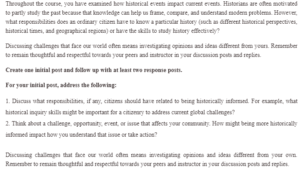The Responsibility to be Historically Informed
Being historically informed includes familiarising oneself with important historical events and aspects shaping the modern world. Historical inquiry exposes an individual to a wide range of information. Some information may be too critical to understanding history, while others may only give a general overview of past events. Individuals have a responsibility to acquire research skills to be historically informed. Subsequently, research skills help ensure that the individual distinguishes relevant and irrelevant information and effectively analyzes a wide range of data to formulate a sound conclusion. For instance, an inquiry on world wars may include a lot of information, including the strategies used in the wars, the cause of the conflicts, and their long-term and short-term impacts. A citizen must compare information from different researchers and identify similar arguments to understand the world wars as significant historical events.
Research skills may also help gather relevant information on how to address challenges in the modern world based on the approaches used in the past. For instance, analyzing historical data on the Great Depression can give citizens an idea of preventing or recovering from an economic crisis.
A Challenge That Affects My Community and How Being Historically Informed Impacts it
The main issue affecting my community is racial discrimination. My community has been experiencing racial discrimination for a long time, and the problem has been part of the community’s history for many generations. Being more historically informed can impact how I understand the issue by enlightening me on how racism occurs, including micro-aggressions, unconscious bias, and measures that have been taken in the past to eliminate the problem. Additionally, being historically informed can enlighten me on why the actions taken in the past to counter racism have not worked, thus enabling me to focus on improving those measures.
References
Hare, J. L., Wells, J., & Baker, B. E. (2019). Essential skills for historians: A practical guide to researching the past. Bloomsbury Academic.
ORDER A PLAGIARISM-FREE PAPER HERE
We’ll write everything from scratch
Question 
Throughout the course, you have examined how historical events impact current events. Historians are often motivated to partly study the past because that knowledge can help us frame, compare, and understand modern problems. However, what responsibilities does an ordinary citizen have to know a particular history (such as different historical perspectives, historical times, and geographical regions) or have the skills to study history effectively?

The Responsibility to be Historically Informed
Discussing challenges that face our world often means investigating opinions and ideas different from yours. Remember to remain thoughtful and respectful towards your peers and instructor in your discussion posts and replies.
Create one initial post and follow up with at least two response posts.
For your initial post, address the following:
- Discuss what responsibilities, if any, citizens should have related to being historically informed. For example, what historical inquiry skills might be important for a citizenry to address current global challenges?
- Think about a challenge, opportunity, event, or issue that affects your community. How might being more historically informed impact how you understand that issue or take action?
Discussing challenges that face our world often means investigating opinions and ideas different from yours. Remember to remain thoughtful and respectful towards your peers and instructor in your discussion posts and replies.